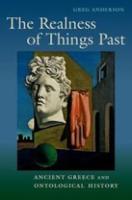
OUP (2018) h/b 318pp £55 (ISBN 0780190886653)
A. argues that we do the ancient world an injustice by thinking about it in modernist Eurocentric terms rather than its own. He is quite right to do so. The job of the historian is to try to get into the ancient mind set as best s/he can. To do that requires an imaginative effort to think like the ancients, which involves, says A., a quite different sort of engagement with the reality of the ancient world to the one it normally receives.
A. argues that the whole problem with our approach is that it divides the ancient worlds into categories that suit our world, but not theirs. Those ‘alien’ past, and indeed some present, worlds often do not make the separation that modernist liberal thinking makes of ‘the material from the cultural, the human from the non-human, the sacred from the secular, the public from the private, the political from the social and the state from the economy.’
So we must try to go back to their world and, in particular, not think of it as somehow a precursor of ours. Historical study for A. must be ‘recursive’, by which he means ‘looking back to or rooted in [the ancient world]’ (not a meaning in these reviewers’ dictionaries). It needs to reject ‘Cartesian dualist metaphysics, whereby experience is dichotomized into objectively real material phenomena on the one hand and merely subjective ideational phenomena on the other’. Modernists who find it impossible to believe that, when the ancients say that gods and the superhuman powers shaped their worlds, they actually meant it, are simply denying the truth of the ancient experience.
The result of this, A. goes on, is that we are distanced ‘perhaps irrevocably from countless non-modern peoples of both the present and the past, from peoples whose modes of being were governed by the unchanging annual rhythms of the seasons and the heavenly bodies, from peoples whose very subsistence was synchronized with the life cycles of animals and plants, from peoples who knew the lands that nurtured them in some sense as their parents or ancestors, from peoples who took it for granted that innumerable, mysterious non-human agents and subjects were always out there, immanent in earth, sky, rivers, and seas, making all human life possible.’
All this is said at rather greater and somewhat more tortuous length than it need be, but it lays the foundations for examples of how this new understanding of the ancient world would work. One example: the place of women in that world.
Here A. points to Virginia Hunter’s work, stressing ‘the active, productive roles played by women in the everyday management and regulation of oikoi and neighbourhoods, with some females even serving effectively as heads of households (kuriai) in certain circumstances’ and Lin Foxhall, who shows that women ‘were routinely involved in the disposition of land and other household resources, and how females were able to work through others to secure courtroom verdicts that were beneficial to themselves and their oikoi.’ Edward Cohen points to ‘women’s widespread involvement in the business activities of households, especially in activities like retailing, manufacturing, and banking’, while Cynthia Patterson highlights ‘the critical contributions made by women to the integrity and vitality of the polis as a whole through their roles as wives, mothers, and household managers.’
This, A. holds, is far from the now traditional picture of patriarchal males devising ‘ever more effective ways to assert their dominion over their largely inert, mostly docile female victims.’ It is all too easy, and wrong, he says, ‘to define female experience in antiquity primarily by negatives, by oppressions, denials, exclusions’. Though none of this means we have to applaud that way of life, we cannot dismiss ancient ‘justifications’ of it as ‘bogus’ just because they do not align with our ‘uniquely modern presuppositions’.
This ‘holistic’ view of a woman’s world is surely in principle correct and stands as a good example of A.’s treatment of a whole range of topics, from the dêmos, the gods and ‘Mother Attica’, to the oikos, being Athenian, policing Attica, ritual, the wealthy and slavery. He also deals with those who seemed to act against ‘the ontological grain’ e.g. Plato, Thucydides, etc. He could easily have added Aristotle (e.g. his Ath. Pol. which divides up the dêmokratia in a remarkably ‘modernist’ way) and the inclination of Greeks in general to look for sharp polarities in describing the world, e.g. Pythagoras’ dualism (especially male vs. female) and Greek literature in general, especially rhetoric, which went out of its way to come up with a μέν that it could answer with a resounding δέ (cf. the dissoi logoi). The fact is that dualism, in a limited sense, is indeed a central feature of the ancient Greek world.
How one would actually write such a history is a good question. An analogy with learning a foreign language in school comes to mind. Once one has learnt it, one rarely thinks about its constituent parts: the language is no longer a set of discrete linguistic rules but a ‘whole’. But that state can be reached only by beginning from its simplest discrete, constituent features and building up from there. Perhaps A. should consider writing a revolutionary ‘holistic’ history of Athens, which does deal with it discrete topic by topic, but shows how one topic locks into the next and slowly builds up the big picture. Meanwhile, it is worth making one obvious point that A. does not emphasize: that knowing the ancient Greek language gets one as close as one ever could get to the experience of ancient Greek mentalité.
A.’s is a very ambitious piece of work. It will attract controversy, but its direction of travel in a world where modern values and concerns are too easily imposed on the ancient is to be applauded.
Peter Jones and Catherine Trend
